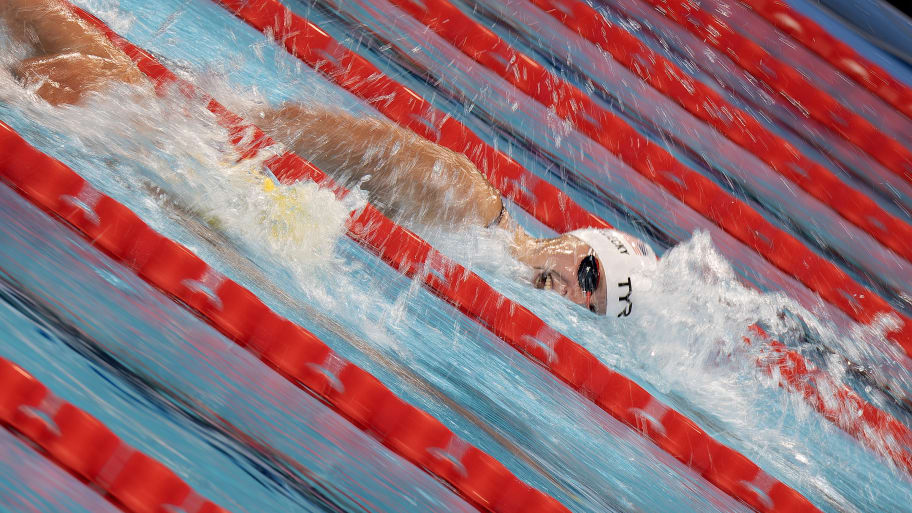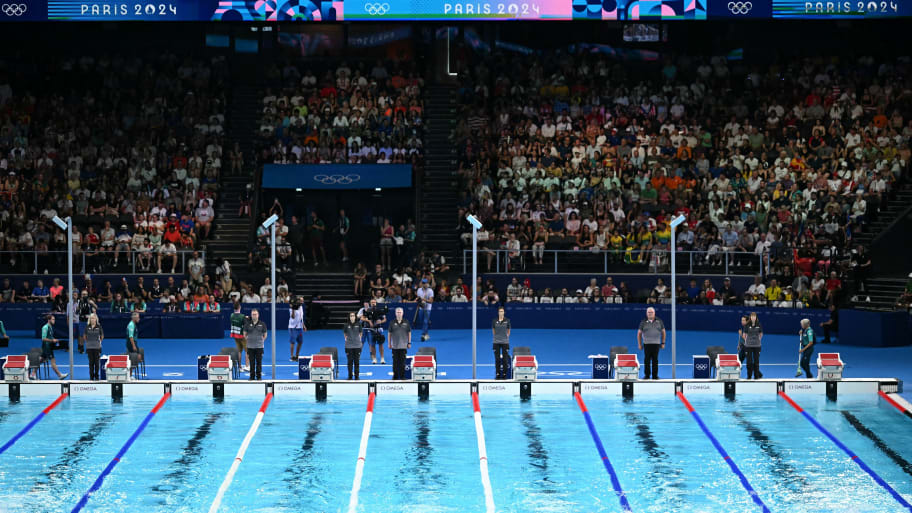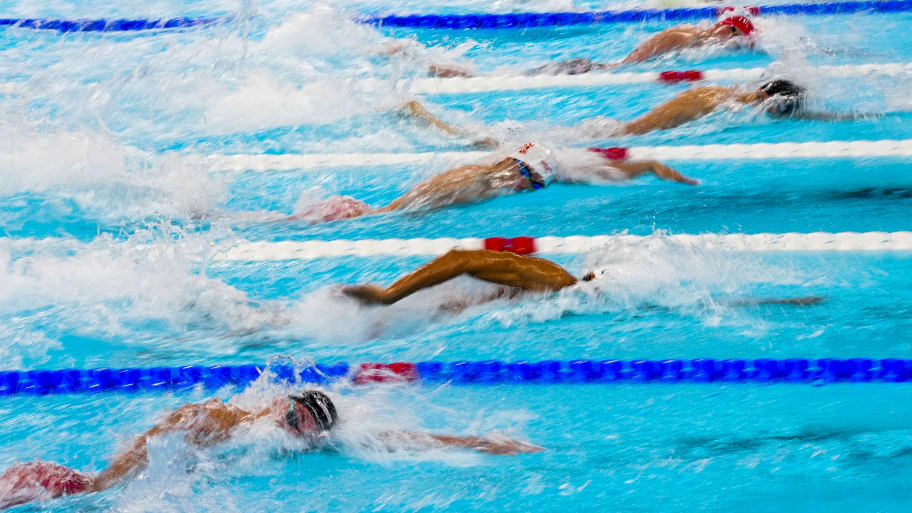
PARIS — There is an old saying in thoroughbred racing that could also be applied to Olympic swimming: time only matters when you’re in jail.
In other words, you race to win—especially at the highest level. How long it takes doesn’t really matter. And given the number of factors that can affect times, comparing and contrasting them is a tricky task anyway.
But the clock rules so many aspects of swimming that it is impossible to disregard. It’s been that way since the first time a coach carried a stopwatch. World and national rankings are based on times, not how many races someone wins. Records are hallowed marks that become etched into the history of the sport.
Now a time-obsessed sport is grappling with the possibility that the Paris Olympics are being contested in a dreaded Slow Pool. It has become the dominant swimming topic of conversation on the pool deck before and after sessions, in the team areas, in the Olympic Village and on the buses to the venue.
Right or wrong, there has been vigorous vilifying of the La Défense Arena pool’s depth. The temporary pool was built at 2.15 meters, which was deeper than the minimum standard of two meters at the time the Paris Games plans were approved several years ago, but more shallow than current World Aquatics recommendations.

Those suggest a minimum depth of 2.5 meters, with three meters the ideal measurement. The temporary pool in Indianapolis for U.S. Olympic Trials was about 2.8 meters deep. Many of the high-level meets around the world now are contested at 2.5 or deeper.
The reason that matters: waves. The more shallow the pool, the greater the turbulence when swimmers make waves. The deeper the pool, the calmer the water.
And those who have been observing the closest—the coaches and competitors—say this pool is far from calm.
“It’s absurdly slow,” says one swimming official who requested anonymity. “It lacks depth, but it also has strange levels. And when you have a shallow pool with as many underwater cameras as we now have, it doesn’t help settle the water.”
The official said the waves are near-constant in the morning preliminaries, when there are more heats stacked on top of each other. But even at night, the surface is rarely calm.
“Even after a seven- or eight-minute break between heats, you can see the water still moving,” the official says. “And if you go back and watch videos from other Olympics, you can see the surface of the water is like glass before every final.”
Still, there is conflicting evidence regarding the “Slow Pool” assertion, and no consensus among coaches and other swimming experts. The overall speed of the field has been faster in some events than in recent Olympics, in fact.
But the winning times are another matter. In a sport that is accustomed—and arguably addicted—to a near-constant assault on the record book, some of the juice has been squeezed out of this competition by a spate of underwhelming winning times.
Through four full days and 15 events, there have been zero world records set. For recent Olympic context, six world records fell in Tokyo three years ago and eight went down in Rio in 2016. Even more recently, 10 world records were set or tied at the 2023 World Championships (three of them were in non-Olympic events that won’t be contested here).
In Paris, there have been six Olympic records in the first 15 events, but not all of those are even personal-best times or national records. French sensation Léon Marchand thrilled the home crowd in winning the 400-meter individual medley by a mile, but did not take down his own world record in the event. American Gretchen Walsh came within .20 of her 100 butterfly world record in the semifinals, but then swam slower in the final and was beaten by teammate Torri Huske.
Both were under world-record pace at points in their races but couldn’t sustain it. And in the case of Marchand, with 14,000 French fans urging him on, it came as a surprise that he didn’t take down his 2023 mark.
Then there are a few events that were jaw-droppingly slow for Olympic finals. The men’s 100 breastroke looked like something out of a time machine, with nobody in the championship final breaking 59 seconds. The winning time of 59.03 by Italy’s Nicolo Martinenghi was the slowest in the Olympics since 2004. British legend Adam Peaty, who tied for second with a time of 59.05, set the world record five years ago at 56.88.
“The time wasn’t fast for anybody,” Martinenghi acknowledged.
The men’s 200 freestyle was won by Romanian David Popovici in 1:44.72, the slowest gold-medal time since 2000. That’s also nearly three full seconds off the world record of 1:42 flat set by Paul Biedermann in 2009. (That was the “super-suit” era, when now-prohibited buoyant suit material helped rewrite the record book.)
The much-hyped showdown in the women’s 400 freestyle between Ariarne Titmus of Australia, Summer McIntosh of Canada and Katie Ledecky of the U.S.—the three most recent world-record holders—was a bit of a dud. None of the three came close to their best times. Bronze medalist Ledecky did not break four minutes for the first time in her career in a major international meet.
But digging further into the numbers reveals some inconclusive data. Of the 15 finalized events, seven have been won in faster times than in 2021 and seven in slower times, with one identical winning time. (Slow times were expected in ’21 because of training being impacted by the pandemic.) Comparing 2024 gold-medal times to 2016, eight have been slower and six faster (one, the men’s 800 freestyle, wasn’t contested in the Olympics until 2021).

What has it taken to get on the podium? The bronze-medal times this Olympics have been faster than Tokyo in seven events, slower in seven and the same in one. But the strong majority have been faster in Paris than in Rio.
And what has it taken to reach the eight-lane championship final? Nine eight-place qualifying times have been slower than in Tokyo, while six have been faster. The comparison of 2024 to '16 goes the opposite way, with 11 times faster and three slower.
It seems clear that the sport has gotten deeper since Rio. There simply are more fast swimmers, which is a credit to the world at large. (And also helps explain why the United States has a fistful of silver at this point instead of gold.) But for whatever reason, the times that are winning gold medals here are not measuring up.
One coach wonders whether front-runners are paying a price in terms of unusual wave turbulence, setting them up to tire and be passed later in races.
“I don’t think anyone has won a final or semifinal at 200 meters or less leading the race start to finish,” the coach says. “It’s fascinating.”
Fascinating and factual, at least in finals. The gold medalists in every race of 200 meters or shorter have not led coming out of the final turn. Only one—Popovici in the 200 freestyle—was even in second. The rest were in third or fourth with 50 meters to go.
The semifinals—when the competition is slightly less deep—has been a bit different. Eleven semifinal winners led at the final turn, while nine semi winners have come from behind. But to the naked eye and by the numbers, it’s hard to deny that there have been several surprising fades late in races by accomplished swimmers.
Perhaps the waves beat them down. There certainly figures to be more of them in the shorter races, when swimmers are at peak speeds and exertion levels and thus creating the most waves and whitewater.
It also follows that it’s hard to break world records coming from off the pace. Generally speaking, swimmers capable of being the fastest ever in a certain event get ahead early, stay ahead and win.
In a time-obsessed sport, the Slow Pool Theory will continue to be watched closely and discussed at length. Could we actually go an entire Olympics without a world record in swimming? Will the come-from-behind trend continue?
That remains to be seen. But it’s useful to remember that at the Olympics, time doesn’t matter nearly as much as place. Every swimmer in Paris would be happy to be the slowest winner of all-time—as long as they have a gold medal around their neck.
“Times don't matter,” said American freestyler Paige Madden. “It's all about place at the Olympics."
This article was originally published on www.si.com as Are the Paris Olympics Suffering From a Slow Pool? .







